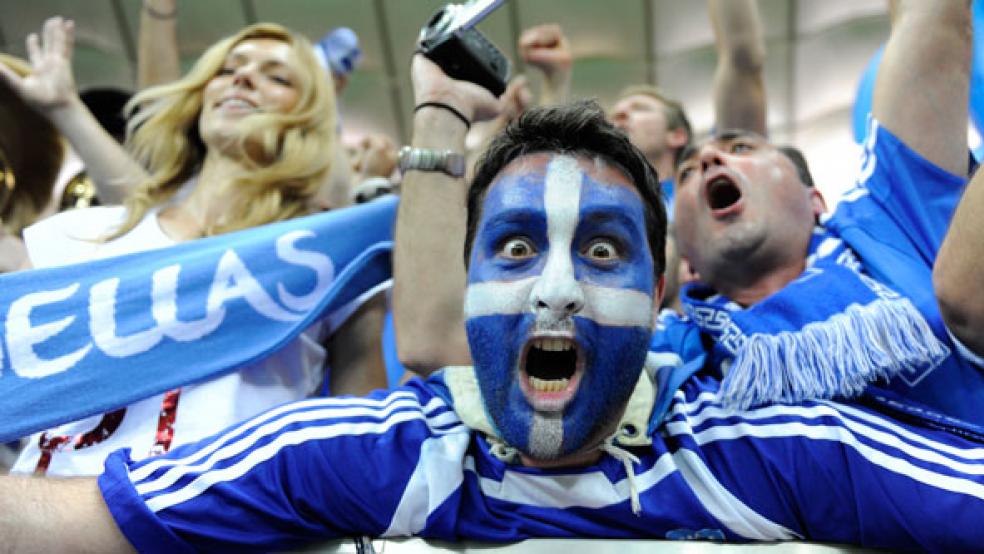This wasn’t supposed to happen. At the start of the Euro 2012 soccer tournament, nobody gave much credence to the possibility of a game pitting Germany versus Greece. It was a fanciful propsosition, that the two extremes within the eurozone would meet on the field in the later stages of the European championship. "Wouldn't it be funny if...."
But given the political tensions that have emerged between the two European nations over the last couple of years, it’s only right that it has come to this, isn’t it?
After years of building political and economic tension – still unresolved – all of Europe can put aside its “real world” worries for a few hours and watch the two countries play out their grudges on the soccer pitch. Or if not put aside those worries, then use them to fuel their fandom – and to let the soccer players decide what the politicians have not be able to. Greece may be asking its lenders – Germany leads the list – for more time to meet the fiscal targets set as a pre-condition for receiving bailout funds, but on the soccer field, at least, it can control its own destiny.
Greek striker Georgios Samaras – no relation to newly elected prime minister Antonis Samaras – reportedly said his team isn’t focused on the political undertones of the matchup, only on the game itself. If that were true, they might be the only ones. But other Greek players have admitted carrying a little extra motivation, and even Samaras had to admit that the team is playing for more than just a win. “We’re playing for the country, for 11 million people waiting for a smile,' he said, according to The Guardian. Greeks fans will also get a chance to vent their overall frustration toward German Chancellor Angela Merkel, who announced that she will attend the game.
German fans will watch the game with bailout politics in mind, too. The Berliner Kurier newspaper reportedly ran a cartoon showing a German government spokesman saying, "our stance on Greece remaining in the eurozone depends entirely upon how the quarterfinal goes."
The sports matchup certainly has parallels to the showdown about the Greek bailout. As it is in the European economy, Germany is a powerhouse on the pitch. Much as expected, the German team has blitzed through its oppossition with little trouble, rolling past stubborn Portugal, shambolic Holland, and plucky Denmark to become the only team to win all its matches so far.
The Greeks, meanwhile, were viewed as being in over thier heads and unlikely to escape a group that contained a silky Russian team, and a Polish team fronted by one of the deadliest strikers in the game. While Germany powered past its competition, the Greeks had to take a more unconventional route to the elimination round of the tournament.
The first game of the competition saw them take on co-host Poland in a sloppy 1-1 draw. This was followed by a 2-1 loss to the Czechs in which the Greeks seemed to know they were on their way home. The game against Russia should have been their last hurrah, but Russia couldn't break down the stubborn Greeks and suddenly a date with Germany was in the cards.
Most fans of international soccer are familiar with the theory that the manner in which a team plays is often indicative of it's national character. The Spanish play with flair, the French swashbuckle in a style that is equal parts exilhirating and infuriating. It's little surprise that an island nation like England would play in a style that resembles an animated game of artillery, and given the manner in which they performed in this tournament, nobody would blame you for accusing the Irish of having had one too many.
No team exemplifies their perceived national character better than the Germans. Like Deutschland’s signature BMW, the German team is a well-engineered machine, designed to demolish opposition. They are, without question, the lead dog in the betting parlors throughout Europe and the world. Far more multicultural than past teams, with a solid number of Polish and Turkish immigrants in the mix (again mirroring modern Germany), the group still displays the Teutonic love for precision and excellence.
The Greeks are a far more difficult team to love. Dark horse winners of this tournement in 2004, Greece has built a team around a style that is derisively called "Anti-Football." They lack the natural pool of graceful talent that countries like Spain, France, Holland and, yes, Germany produce with regularity, but the Greeks compensate for this with disciplined, organized, defensive performances that are designed more to thwart the other team's attack than create one of their own.
Pragmatists point to the results so far and the victory in 2004, but purists argue that this pairing of styles strips the game of its spectacle, and without that...what is it? The game could become a miserable affair of stifled attacks; Greece could be steamrolled under the German juggernaut, or...it could strike a blow for the underdog, and a break from the bitter reality of the last few years – albeit just a brief one. EU leaders are scheduled to gather for another summit meeting in Brussels next week.




